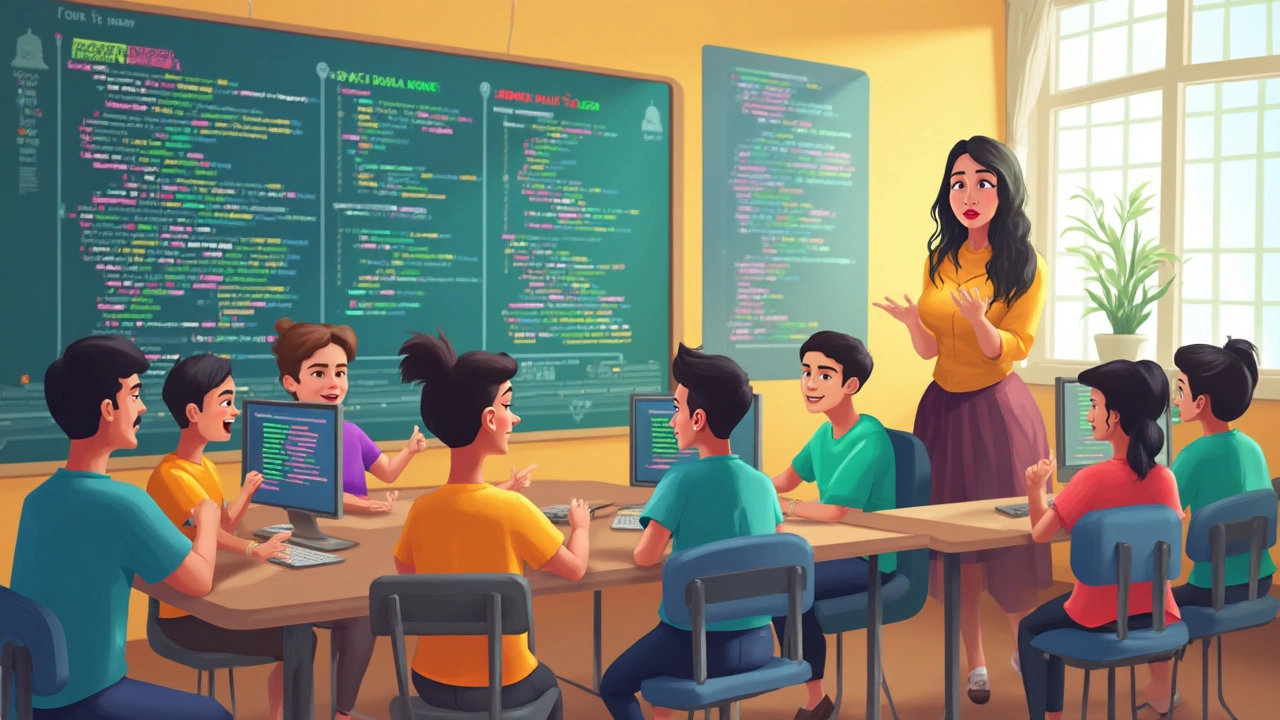You’ve probably seen ads for coding bootcamps promising a career change in under six months. Seems wild, right? But honestly, coding schools don’t come in just one flavor. They range from intense, full-time bootcamps where you’re basically in class all day, to chill online courses you can do on weekends. There’s no one-size-fits-all answer to how long it takes, but there’s a pattern once you dig in.
Some folks blitz through in as little as 8–12 weeks (yeah, that’s just a few months), but you’ll also find longer programs that stretch out over a year—especially if you’re juggling a job or other life stuff on the side. Most common? Three to six months is the sweet spot for bootcamps if you can treat it like a full-time job. Want to keep earning while you learn? Part-time classes make the journey longer, but sometimes that’s the only way it fits into a busy life.
Before you pick, figure out how much time you can really give. Some people burn out fast if they try to keep up with a full-time bootcamp and a full-time job. On the flip side, moving too slow can drain your motivation. The time commitment is a big deal, so don’t just go by what a school promises—know what works for you.
- What Even Counts as Coding School?
- Common Timelines and Course Formats
- How Your Schedule and Goals Change Things
- Tips for Getting the Most Out of Coding School
What Even Counts as Coding School?
Not all places that teach you to code are the same. When people talk about "coding school," they usually mean either a coding bootcamp, a coding academy, or sometimes a university-style course that’s focused on programming. But even short online courses or night classes at your local community center can fit the bill if they teach the basics of programming in a structured way.
The three big types you see most often:
- Coding bootcamps: These are usually fast, full-time, and promise to get you job-ready in a matter of months. Big names include General Assembly, Flatiron School, and Le Wagon.
- Part-time or online coding classes: Stuff like Codecademy Pro, Udemy, or Coursera. These are more self-paced, super flexible, but might not cover as much as a full bootcamp.
- College programs or coding diplomas: Community colleges or universities sometimes offer shorter coding certificates built for career changers. These run longer, often 6–12 months, and may dig into computer science topics too.
Here’s a quick comparison of how some common coding school formats stack up:
| Type | Time Commitment | Typical Length | In-Person or Online? |
|---|---|---|---|
| Full-Time Bootcamp | 40+ hrs/week | 3–4 months | Both |
| Part-Time Bootcamp | 10–20 hrs/week | 6–12 months | Both |
| Self-Paced Online Course | Flexible | Varies (often 6–12 months if consistent) | Online |
| College Certificate | 15–20 hrs/week | 6–12 months | Both |
If you hear someone say they "went to coding school," it could mean anything from grinding through an intense full-time bootcamp to learning Python at night after work. The important part is whether the program sticks to the basics needed for entry-level software jobs: languages like JavaScript, Python, HTML/CSS, frameworks like React, and teamwork projects. Pick the format that matches your learning style and schedule—it’ll make sticking with it way easier. And remember, the coding school label is less important than getting real skills you can use.
Common Timelines and Course Formats
If you’re wondering how long it really takes to finish coding school, it depends on the type of program you pick. Full-time coding bootcamps usually last between 8 to 16 weeks. These are intense—think of it as a job, with classes, projects, and sometimes group work happening every weekday. Some schools, like General Assembly or Flatiron School, stick to this sprint-style timeline, and students usually treat it like a fast track to a whole new job.
There are part-time coding bootcamps too, which stretch from about 20 to 36 weeks. These are aimed at people who don’t have the luxury to quit their day job or pause their life. You might have class a couple nights per week and maybe some weekend sessions. You get more breathing room, but it does mean juggling your existing life and study time. A school like Thinkful, or the part-time option from Le Wagon, goes this route.
If you want something even less structured, look at self-paced online courses. These let you move at your own speed—some people blast through a course on platforms like Codecademy or Udacity in a month or two, while others take a year or more. These platforms will usually share average completion times, but you’re the boss when it’s self-paced. The risk here? It’s easy to fall off if you’re not keeping yourself honest.
Traditional college coding classes are the slowest, usually following regular semesters. If you’re doing a computer science degree, you’re looking at a classic four-year timeline. But if the goal is to just get marketable coding skills, there’s no rule you have to go the college route anymore—bootcamps and online classes can get you job-ready faster for way less money.
- Full-time bootcamps: 8 to 16 weeks (fast, demanding)
- Part-time bootcamps: 20 to 36 weeks (flexible for busy lives)
- Self-paced online courses: Fully flexible (finish in weeks or months—it’s up to you)
- College classes/degrees: Semester format, up to 4 years (the long haul)
The key is to pick the structure that fits your life and learning style. There’s no “best” path—just the one that lines up with your goals and how soon you want to be on the job market, code in hand.

How Your Schedule and Goals Change Things
Your personal life isn’t going to pause just because you’re starting coding school. If you work full-time, have a family, or just want to learn at your own pace, your timeline is going to look totally different from someone doing a full-time bootcamp. That’s where picking the right format matters.
Full-time programs expect you to treat learning like a job—usually 40+ hours a week, Monday through Friday. If you can swing that, you’ll finish a standard coding bootcamp in about three to four months. But not everyone can drop everything, so most schools now offer part-time or self-paced options. You might only study nights and weekends, stretching your timeline to six, nine, or even twelve months. It’s not worse—it’s just what fits.
Let’s compare how different schedules play out:
| Program Type | Weekly Hours | Typical Duration |
|---|---|---|
| Full-Time In-Person Bootcamp | 40+ | 3–4 months |
| Part-Time Bootcamp | 15–25 | 6–12 months |
| Online/Self-Paced Course | 5–20 (flexible) | 3–18 months |
Your coding school journey should match your real life. Want to land that software dev job and jump-start your career fast? Full-time is your route—if you can take the break. Need to keep your paycheck coming? A flexible or part-time path is totally doable; just block off time every week like it’s a real class, or your progress stalls.
- Be honest about your daily schedule. Count up exactly how many hours you can study before committing.
- Set goals about what you want from coding school (job-ready, portfolio, side projects?) and how fast you want results.
- Check if the school offers career support—some longer programs sneak in resume help and job search tips, which can be worth the extra months.
Bottom line: There’s no magic number. The best program is the one you can actually finish. And finishing is what employers really care about.
Tips for Getting the Most Out of Coding School
Coding school is intense, and honestly, what you put in is what you get out. Here are strategies that actually work, whether you’re in a fast-paced bootcamp or doing part-time online classes after work.
- Pick a program that fits your schedule, not just your dreams. If you need to work, don’t sign up for something full-time and hope for the best. A lot of dropouts come from biting off more than they can chew.
- Keep up with assignments, even when you don’t feel like it. Deadlines are your friend—they force you to practice. Practicing every day, even for 30 minutes, is way more effective than cramming on weekends.
- Ask questions. Don’t let stuff pile up just because you’re embarrassed. Everyone gets stuck—the people who speak up move forward faster. Instructors and TAs are there for a reason.
- Start building projects as soon as you can. Personal projects don’t have to be fancy, but they turn theory into real skills. If you build a to-do list app, a website for a hobby, or automate something silly, that’s legit progress. Real employers love to see side projects.
- Make friends in your cohort. Most bootcamps and coding school programs thrive on teamwork, and your peers can explain concepts in relatable ways. Plus, you’ll need a buddy for late-night debugging.
Last thing—don’t stop when class ends. The first coding job doesn’t fall in your lap; you’ll need to keep applying, building, and learning. Stack Overflow, GitHub, and Discord groups are gold mines for help and support. If your program includes career help, actually use it instead of ghosting your advisor after graduation.
